The musical compositions of Richard Burdick
Follow on Twitter
Opus 143
Symphony No. 2
"From
Spectrum to Hipster and Beyond"
(2005)
I. "Spectrum"
Moderato (4 minutes)
II. "Cuckoo" Moderato e legato (3
min.)
III. Adagio ala Shostakovich, seriously (4
min.)
IV. "Rush
Hour" Quickly and agitated (6
min.)
V. Beyond (2.5
min.)
Complete playlist:
My symphonies (Now three plus the ten chamber symphonies) in general do not following any standard sonata-allegro or other standard symphony form, but are a presentation of four or five stylistically contrasting movements.
I began this work as a revision to my opus 2 "Spectrum for Organ and Strings" and continued it as my Second Symphony.
I have plotted out eight movements in the revision of opus 2, and if I ever to finish, the revision it will have a couple of movements that are very minimalist with a very long crescendo. I composed the eighth movements of the revision, mostly on my visit to Carefree, Arizona for the festival there in February 2005. This last Movement of the revised opus 2 is now both the last movement of opus 2 and the first movement of this symphony. (If Bach can repeat music, so can I!) Opus 2 (if I ever complete the revision) could flow directly into opus 143 as an twelve movement concert work.
Movement 1:
Movement one is a "spectrum" it contains a row of twelve different intervals: octave, m6th, p5th, M7th, P4th, m3rd, M2nd, M6, d5th, m2nd, m7th, M3rd. This although is interesting and sort of fun to do, lacks any real way to organize larger chords, and ultimately has nothing to do with music except a throw back to the twentieth century.
Each movement is for a slightly larger group of musicians:
The first is written of the Regina Symphony Core orchestra
of single woodwinds, trumpet, horn and strings (11 parts) 1111 1100 & five
string parts.
Movement 2:
Movement two was written during the "Music in the mountains festival" in Grass Valley California during June of 2005. The initial inspiration was two fold: Delius's Cuckoo and the melody which includes a 7th harmonic and an eleventh harmonic, but can be played in "normal" orchestra temperament, which as you know is almost equal with some lowering of 3rds and 7ths and a touch of enlarging the fifths . . . and vibrato to hide the poor intonation. The piece is in I Ching scale # 49 which is the one that fit the melody th e best.
The second & third movements are for 2 piccolos, 2 oboes, 2 Eb clarinets, 1 Bassoon, 2 trumpets, 2 horns,1 trombone and strings. (2221 2200 strings). (percussion added in 2017 see the bottom of the page).
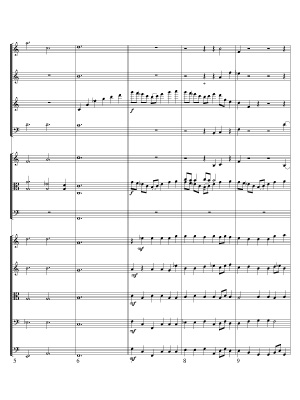
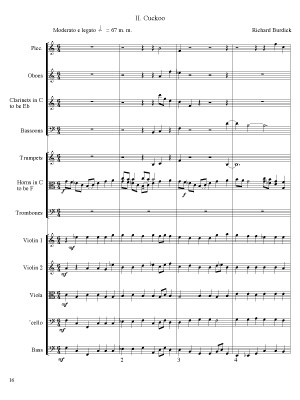
Movement 3:
Movement three and four are in four keys. After practicing my ascending and descending harmonic minor scales, I started thinking about pairing up scales in ascending and descending combined forms SO I used 38 & 64 (G & A )and 54 & 40 (B & A) in pairs.
I feel the opening scales of M.3 could sound really stupid if it is not taken really seriously like Shostakovich.
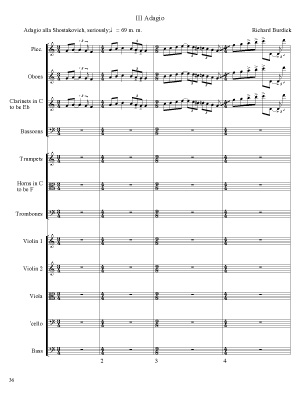
The tonics of these four keys is how I arrived at the initial theme of M. 4: G -A -B -A
In developing movement four with the initial four note theme, I had been trying to add percussion to the piece all along, and finally got the idea of a hip bongo solo. I like the theater aspect of having a bongo player run out to the front of the orchestra and play a "hot" solo. Then for the final coda I am accepting the attitude of Carl Nelsen and bringing in a brand new theme to bring to symphony to a close in I Ching #58 (D major).
Movement 4:
The fourth movement changes the piccolos to flutes and adds three percussionist play Tubular bells, gong and bongos. (all percussion parts improved in 2017 see the bottom of the page).
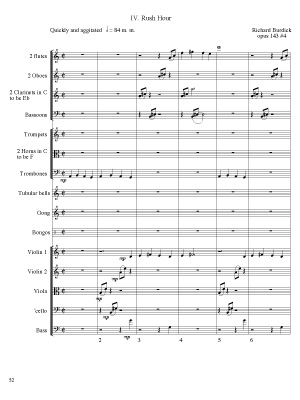
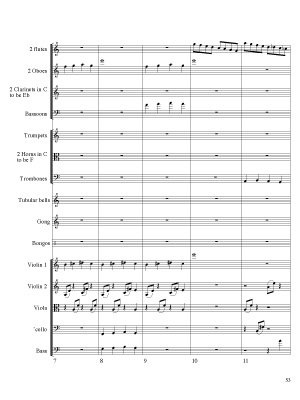
The Fifth:
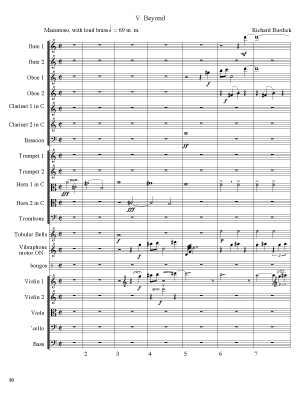
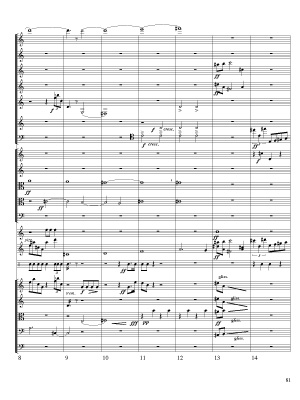
Percussion use by movement
(as of 2017 revision):
1: none
2: Timpani, Bongos, Vibraphone
3: Timpani, Bongos, Vibraphone
4: Timpani, Bongos, Tam-tam, Tublular Bells, Vibraphone
5: Timpani. Bongos, Tublular Bells, Vibraphone
It took me nine months to write my second symphony, opus 143
Search I Ching Music:
CD 1 - Rebel with a Horn
CD 2 - I Ching Arpeggios, Op. 99
CD 3 - H o w l e r s - Louis-François Dauprat’s 20 Duos for Natural
CD 4 - 4.5 INCH SINGLE Aaron Blumenfeld’s Sonata Horn & Piano
CD 5 - "Let Me Out
CD 6 - "Richard Burdick with tape"
CD 7 - INFINITY ONE
CD 8 - Portal
Solo Multi-phonic French horn In An Environment of drones & overtones.
CD 9 - Louis-Francois Dauprat
Duos for Horns, Op. 13 vol. 1
CD10 - The Planets for solo horn, Op.19
CD11 - 64 Duets, Op. 132 Pt. #1-16
CD12 - Reveré by Victor Herbert
CD13 - 64 Duets, Op. 132 pt #2 #17-34
CD14 - Richard Burdick,
Performs Dauprat’s Op. 8
CD15 - Richard Burdick, - J. S. Bach's Easter Oratorio, BWV 249
CD16 - Howlers Revised 2006 Dauprat Duets, Op. 14 & Mozart
CD17 - Favorites - Barber, Grieg, Bach BWV 82 & 225
CD18 - Louis-Francois Dauprat
Duos for Horns, Op. 13 vol. 2
CD19 - Dauprat's Grand Music
for horns
CD19a - Dauprat's trios opus 26
CD20 - Classical Gas
CD21 - Beyond Favorites
CD22 – Naderman’s Music
for Horn and Harp
CD23 - More than 64 solos for Horn, Op. 139
CD24 - Duets, opus 132 complete
in the "one take" version
CD25 - Nice Notes
CD25a - Bach Cantata BWV 132 No. 1
CD26 - Accuracy Studies For the French horn student
CD27 - Anton Reicha Trios
Op. 82 & 93 complete
CD27a - Richard O. Burdick - Castelnuovo-Tedesco's horn quartet
CD28 - WAVES AND PARTICLES, opus 159 PART ONE - Waves
CD29 - Astral Waves & Phosphor
CD30 - Grand Music of J. F. Gallay,
vol. 1
CD31 - Grand Music of J. F. Gallay, vol. 2
CD32 - American Horn Music of the 40's & 50's
CD33 - More than 64 Quartets for horns based on the I Ching
CD34 - Natural Horn Music FOUND
CD35 - Twenty-Two Trios for Horns, Op. 156
CD36 - Classical Natural Horn
Music By Duvernoy & Schneider
CD37 - Microtonal music of
Richard Burdick
CD38 - Matthew Locke - Broken & Flatte Consorts
CD39 - Bach by Popular Demand
CD40 - Retrospective II-
The horn Quartets
CD41 - American Horn Music vol. 2
CD42 - I Sound My Horn
CD43 - Horn Music of Silvio Coscia
CD44 - Opening the Sphinx
CD45 - North American Horn Music
CD46 - A Rainbow of I Ching triads
CD47 - I Ching Rhythms, Op. 209

